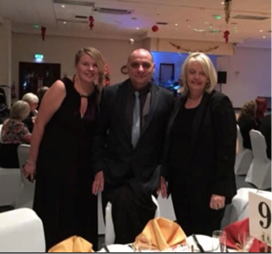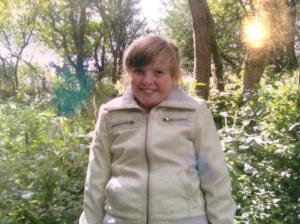
I came to live in foster care aged 9. Before I came into foster care I lived with my mum, dad, two brothers and sister. Things weren’t good at home and just me and my sister came into foster care. I know some of the reasons for this, but I don’t know the whole story.
My sister and I were placed in the same home to begin with. We stayed there for nearly 6 years. I was told that my foster carers were struggling with my behaviour towards the end of my time there and asked for me to be moved. I had become a teenager and they couldn’t cope with me being a bit rebellious. My social worker told me that I was going on rest bite for a while, but I ended up staying in the new placement for the next six months. I didn’t go back to live with my sister. Meanwhile, my social worker was looking for a new family for me to live with.
The social workers arranged for me to see my sister every now and again, but our relationship broke down. It wasn’t the same as when we were living together, and we were both confused about why that was.
In early 2014 my life changed. I went to live with new foster parents who were part of Match Foster Care and moving there changed my life. They accepted me as part of their family, and they made me feel loved and cared for. Although lots of children in the care system are forced to leave aged 18, I still live with my foster parents and they continue to support me in the same way they have with their birth children.
In fact, after living away from my sister for 4 years, in 2017 my foster parents were able to give her a place in our family too, so that’s a really happy ending for us.

Now that you know a little bit about me and my experience of being in care, I’d like to talk to you about my experiences in education.
We know that the educational outcomes for looked after children are poor, so things need to change.
If you do what you’ve always done, you’ll get what you’ve always gotten.
– Tony Robinson

This is me, Maz. A photo taken not long after I was taken into care. I’m currently studying at university and things are looking very positive for me.
However, things were different for me at school. Home life with my birth family was difficult and that meant that school life was too. My home life meant that I didn’t live in an environment where a reading book could be kept safe for return the next day, it would be lost, damaged or forgotten. My birth parents didn’t help me with reading, spellings or homework. In fact, school attendance wasn’t really a high priority for my birth parents, and I was lucky if they managed to get me to school at all. That meant that on the days that I did get to school, I’d usually be late and then be expected to catch up on everything I’d missed. My education suffered because of this.
When I was taken into care, I found out that education was a priory for my carers. However, things were still difficult for me at school, and I was treated differently to my friends. Social workers would come to visit me at school because doing that suited their needs, not mine. I would be taken out of class for a meeting with my social worker, who wore an ID badge dangling from her neck. And everybody knew that was happening. My friends would ask me where I had been and why people were having meetings about me.
It seemed a bit unfair that a social worker could turn up at ‘my school’ when I’d never even been to their office. Can you imagine what would have happened if I’d have turned up at her office, without any notice or planning and just demanded that they were asked to leave a meeting to see me?
Do you know what a LAC Review is? It’s a meeting that is held every six months to review what is happening for a looked after child. Lots of people come to these meetings, foster parents, social workers and teachers. It’s important that teachers are there so that they can help plan for a child educationally. However, often, these meetings take place at school so that teachers can fit them into their day. Can you imagine what it feels like to have a meeting, where almost every aspect of your life is discussed at school? Can you imagine how that feels to a child? I remember one time, my birth parents turning up at school for one of these meetings and I’d not seen them in months, and I wasn’t expecting it. These meetings should not happen in school.
I’ve also heard people discussing things in corridors that I shouldn’t hear. Such as, who is going to pay for things for me. Who is going to pay for a school trip or a laptop? A child in care shouldn’t hear these things or even care about them.
There was also always a big deal made of school trips and holidays, haircuts and overnight stays with friends. I understand that there is a different process to follow, but your job is to find a way to do that that allows me to have the same opportunities as my friends. It’s called equality and it applies to looked after children too. It means that a looked after child should have the same opportunity as any other child, but you just might have to do more to make that happen.
My looked after status was always given more attention than my education. It got in the way of me being treated in the same way as my friends. The conversations about university didn’t seem to apply to me at school. It felt like people thought ‘she’s just going to fail anyway’ or ‘looked after children don’t go to university’. Well, I’ve proved them wrong!
Maybe I’m being quite harsh though, I did have a teacher that made me feel that I could achieve. And as I got older, I had foster parents and a group of people at Match Foster Care who thought I was amazing and could achieve anything I set my heart on and having that has changed my life.
Look at me today, I’m learning to drive, and I have a car and a part-time job at a care home and I’m in my final year at university. I am also a founding member of the Match Foster Care Children’s Panel and I interview new staff, foster parents and advise on how Match should be run. Because people believed that I could. And I did.
There are around sixty-five thousand children living with foster parents in the UK. We know that children in care, on average, achieve poorer educationally than their non-looked after peers. This gap widens into higher education. That’s a lot of children who aren’t given the opportunity to reach their full potential in life.
The barriers facing care-experienced young people achieving an education are immense and make for a for grim read.
Well, this was my reality in education, but I had something different. I had an incredible SENCo at my school. She took time to find out what was going on at home for me. She understood that I might have seen my birth parents at the weekend for the first time in a year. She understood that that sort of thing might have an impact on how I was at school.
She got to know me so that she understood why I might have been behaving in a different way. She would take time out of her day to take me to one side and see if I was ok. She fought my corner with the people who didn’t really know what was going on for me.
Most importantly, she said that she believed in me. I’d never heard that before. She believed that I could achieve, and she made that happen by sorting out lots of things for me such as extra support with Maths and English.
She is an example of the difference a good professional can make on a child in care. Now, as an adult I get to work with professionals and share my story with them too to help make the system better.
I wanted to finish by sharing with you the three pieces of advice I tell all social workers/professionals that I encounter:
1 – Listen to the child.
2 – Listen again.
3 – Listen some more.
– Maz
Thank you for reading my story today.
Comments